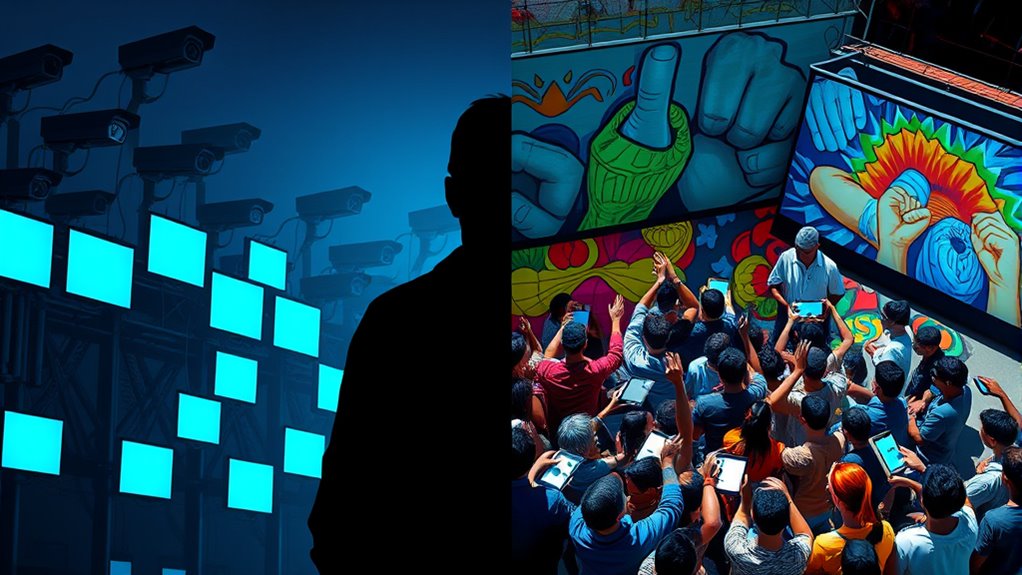Digital authoritarianism and digital democracy represent opposing values in how societies use technology. While authoritarian regimes use digital tools to control, surveil, and censor, democracies aim to empower citizens and protect privacy. Your choices in supporting or challenging these approaches influence societal norms and personal freedoms. Understanding these differences helps you see how technology shapes social environments. Keep exploring to uncover how these battles affect your digital experience and future.]
Key Takeaways
- Digital authoritarianism prioritizes control, surveillance, and censorship, restricting individual freedoms and privacy.
- Digital democracy emphasizes citizen participation, transparency, and the protection of free expression online.
- The contrasting approaches influence societal trust, cultural norms, and the environment of digital spaces.
- Policy and regulation determine whether technology reinforces authoritarian control or promotes democratic values.
- The battle reflects broader societal debates over privacy, security, and the role of technology in governance.

As technology continues to evolve rapidly, it has become a powerful tool for shaping societies in fundamentally different ways. In the domain of governance, this has led to a stark divide between digital authoritarianism and digital democracy. You might find yourself caught between these two competing visions, each influenced by how governments use digital tools to control or empower their citizens. On one side, there’s the surveillance state, where authorities deploy extensive monitoring systems to keep tabs on everyone’s activities. These surveillance measures often go hand-in-hand with strict censorship policies, which limit access to information and suppress dissent. When governments prioritize control over freedom, technology becomes a means to track, silence, and manipulate, eroding individual privacy and suppressing free expression. You may feel the impact directly if, for example, your online activities are scrutinized or if your access to certain websites or social media platforms is restricted or censored. This environment discourages open dialogue and fosters fear, making it easier for those in power to maintain their authority without accountability. Additionally, the contrast in technological approaches significantly influences how societies develop their norms around privacy and freedom. Moreover, the methodologies used in ethical hacking highlight the importance of security assessments in protecting against malicious cyber activities that could be exploited by authoritarian regimes to strengthen their control or by democratic societies to ensure the integrity of their digital spaces. Understanding the role of policy and regulation is crucial in shaping whether technology serves as a tool for suppression or empowerment. Recognizing the importance of farmhouse kitchen textiles and accessories and their role in creating a cozy, inviting environment reminds us that technology can also be used to foster community and shared spaces in a digital age.

Mullvad VPN | 12 Months for 5 Devices | Protect Your Privacy with Easy-To-Use Security VPN Service
- 12-Month VPN Subscription: Use on 5 devices without renewal
- Enhanced Privacy Protection: No activity logs or personal data
- Device Compatibility: Supports Windows, Mac, Linux, iOS, Android
As an affiliate, we earn on qualifying purchases.
As an affiliate, we earn on qualifying purchases.
Frequently Asked Questions
How Can Citizens Effectively Resist Digital Authoritarian Controls?
To resist digital authoritarian controls, you can engage in digital activism by sharing information, organizing protests, and supporting open platforms. Empower yourself and others by staying informed about digital rights and advocating for stronger privacy laws. Use secure communication tools and VPNs to protect your data. Citizen empowerment is key—collaborate with like-minded individuals and hold authorities accountable, ensuring your voice contributes to a more democratic and free digital space.
What Role Do International Laws Play in Digital Governance?
Oh, international laws are just delightful puzzles, right? They play a key role in digital governance by shaping how nations claim cyber sovereignty and enforce rules across borders. International treaties act as the handshake agreements, setting standards and resolving conflicts, or so they hope. You get to be part of this global game, where these laws try to balance control and freedom in the digital domain, even if it’s not always perfect.
Can Digital Democracy Coexist With Surveillance Technologies?
You might wonder if digital democracy can coexist with surveillance technologies. It’s possible if you prioritize digital privacy and establish clear surveillance ethics. By implementing transparent policies and respecting individual rights, you can safeguard security needs with privacy concerns. Responsible use of surveillance tech ensures democratic values are upheld, allowing you to enjoy the benefits of technology without sacrificing your freedoms or privacy.
How Do Social Media Platforms Influence Digital Authoritarianism?
Social media platforms influence digital authoritarianism by enabling or restricting online activism through social media censorship. When authorities or platform policies suppress dissent, it limits free expression and consolidates control. Conversely, platforms can also empower citizens to organize and voice opinions, challenging authoritarian practices. Your role as a user affects this balance—supporting open dialogue fosters democracy, while tolerating censorship can inadvertently strengthen authoritarian tendencies.
What Are the Ethical Implications of Digital Surveillance for Privacy?
You might think digital surveillance helps keep us safe, but it often leads to privacy erosion and consent dilemmas. When your data is collected without clear permission, your right to privacy suffers. Ethically, this raises questions about autonomy and trust. You need to contemplate how surveillance impacts personal freedom and whether sacrificing privacy for security is justified, knowing that unchecked monitoring can undermine fundamental rights and societal values.

PhoneX – Secure communication
- End-to-end encryption: Secures calls, messages, and files
- Peer-to-peer calls: Direct voice communication
- Advanced cryptography: Includes perfect forward secrecy and ZRTP
As an affiliate, we earn on qualifying purchases.
As an affiliate, we earn on qualifying purchases.
Conclusion
As you navigate this digital battlefield, remember that the clash between authoritarianism and democracy is like a tug-of-war for our rights and freedoms. Your choices and voices are the threads weaving the fabric of our digital future. Stay vigilant, because the stakes are high—one side seeks to chain your voice, while the other aims to set it free. Ultimately, it’s your active participation that will tip the scales toward a future rooted in values you believe in.

Open Secrecy: How Technology Empowers the Digital Underworld
As an affiliate, we earn on qualifying purchases.
As an affiliate, we earn on qualifying purchases.

Into The VPN Tunnel: An eye-opening guide that emphasizes the value of Virtual Private Networks to protect your internet privacy.
As an affiliate, we earn on qualifying purchases.
As an affiliate, we earn on qualifying purchases.









